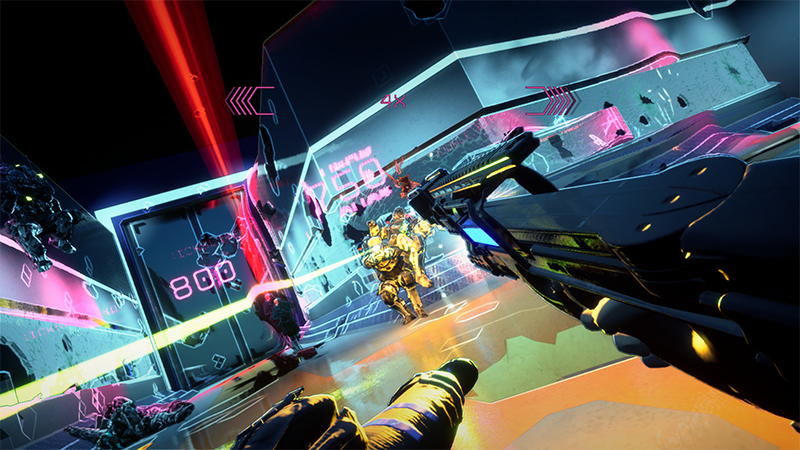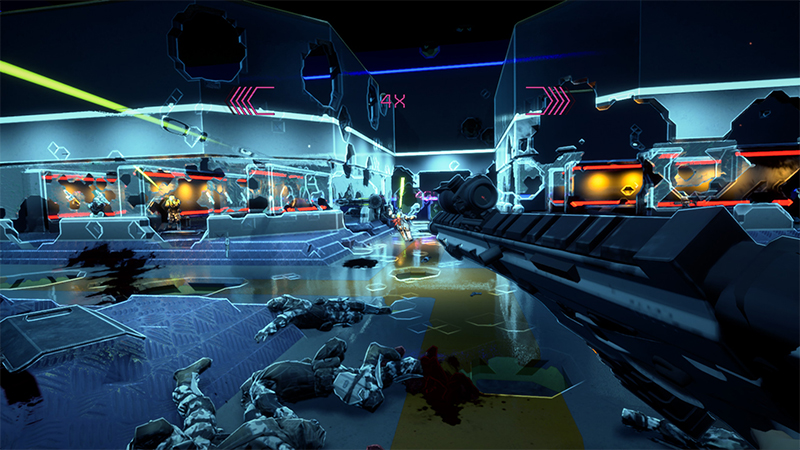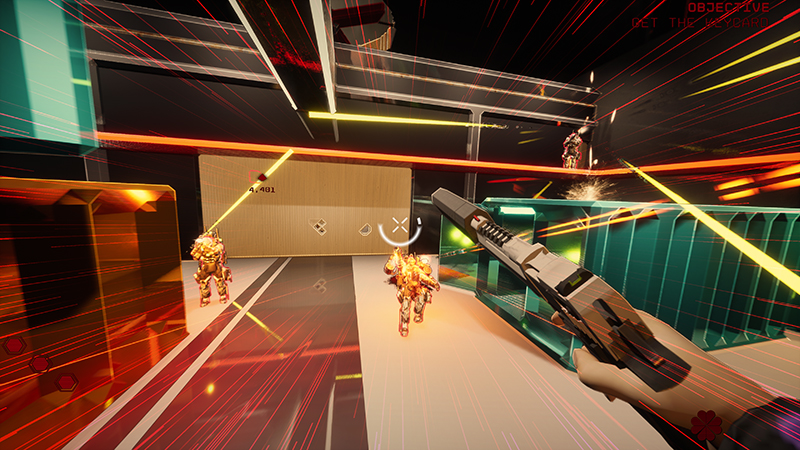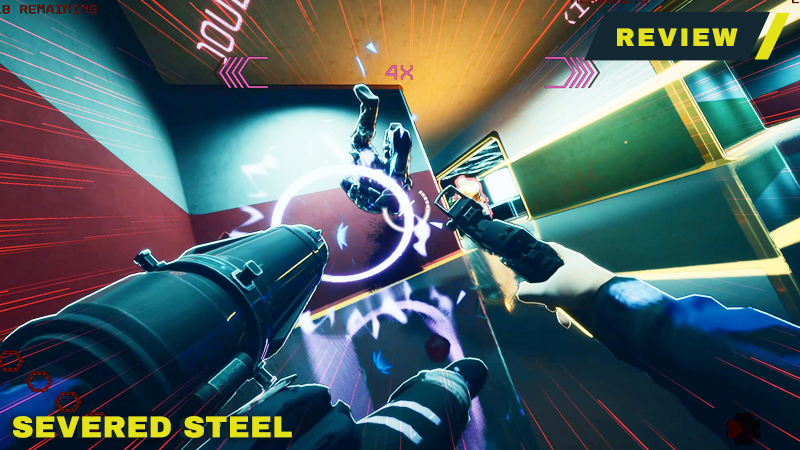In an apparent response to the sluggish cover-based shooters and realistic military games from the past 15 or so years, many modern shooting titles have been going the opposite way and tried to evoke the nimble action from the genre’s inception in the ‘90s. Dashes, double jumps, wall running, and grappling hooks are almost a necessity to figuratively and literally keep up. Severed Steel was bred from that same design document with its blisteringly quick gunplay, but goes above and beyond many of its contemporaries by mixing in a liberating amount of destruction.
As ironic as it sounds, Severed Steel is almost exclusively going to be played in slow motion. Lining up shots and getting out alive is an incredibly tall task when played out at normal speed, as enemies (on its “definitive” harder difficulty) are deadly and swarm in hordes. It’s intimidating at first since it’ll punish those who are playing this more like a traditional first-person shooter and even people who are only sporadically using bullet time. Load times following a death are also a little longer than they should be, making this growth period a little more painful.
RELATED: Bright Memory: Infinite Review: Brief, Brisk, but Not Too Bright
Its lackluster tutorial that skips telling players most of its mechanics is partly to blame, but this early and constant pressure forces players to adapt and actually utilize its systems to progress. Severed Steel is all about knowing when and how to use slow motion in conjunction with its array of parkour moves and the two work together wonderfully. There is a slow motion button that drains a meter, but the meter doesn’t drain when diving, wall running, or sliding, which is an incredible feedback loop that pressures players to constantly act like Neo in The Matrix.

Incentivizing players to play it in the most stylish way imaginable works because it makes players see how solid the gunplay is at its very core. Simply jumping around and popping melons as time slows is inherently rewarding since the smooth movement, ferocious-sounding guns, and helpful sound effect that plays when a foe falls provide a rock-solid foundation that yields the necessary feedback and feel that a good shooter requires.
But it all gets much better when players begin wall running, chaining acrobatics, and flipping around. This is most obviously shown when diving since the game does not limit the X-axis while aiming down, meaning it is possible — and heavily encouraged — to jump over an enemy and continue shooting while upside down. Landing headfirst after somersaulting in the air is only momentarily disorienting, but well worth the trade-off since it gives the game such potential for ridiculous stunts that never cease being satisfying. Wall running and diving (which lets the player redirect in midair) are also useful tools, if more standard in their execution.
Flipping is yet one flashy maneuver in a game full of them. Picking up weapons and ammo is effortless since Steel, the protagonist, snatches them automatically when her clip runs dry; a killer quality-of-life feature that works incredibly well for a game with this kind of pacing. The grab range on this is pretty generous, too, and can lead to sequences where it’s possible to dump almost nonstop when clearing a room, rapidly scraping pistols and shotguns off the floor as if her itchy trigger fingers were magnetic. Steel can also, well, steal guns right from an enemy’s holster or, after a swift kick, right from their grubby little hands. It is endlessly empowering to be able to always snatch a gun from someplace and is yet another way the game creates player-generated moments of sheer badassery.

Most shooters of this ilk would simply stop at flashy gunplay — and Severed Steel could easily get by if it did — but it excels over its peers with its environmental destruction. After a few levels, players get access to a Samus Aran-like arm cannon, which recharges after slaying certain foes. And while it can act as a more typical death beam, it can, more interestingly, also cut through almost any surface.
This opens up the level design and gives even more power to the player since walls, ceilings, and floors and no longer barriers, but another puzzle to solve, one with multiple solutions. Instead of trying to find a door or a staircase to an objective, it’s often more efficient to just strategically blast a certain spot in the ceiling to wall run right up to the goal, or shoot straight down and fall right on top of it. It’s also possible to use it offensively and take out the floor beneath an enemy one level up or defensively by creating a quick escape.
RELATED: Shadow Warrior 3 Review: Flaccid Wang
Environmental destruction has a ton of different uses that all compel players to think creatively. Some of this transfers to a handful of the objectives that overtly call on players to use the cannon in certain ways. For example, one stage has an extremely thick door on the other side and tasks users with burrowing through it as they fend off hostiles and gather cannon charges from their corpses. Delicately digging a clean hole while also fending off hordes is tense and a brilliant use of its mechanics. There are a few inventive missions like this, but the game has more than enough instances where this kind of play is not overtly mandated, but encouraged, which still yields more than enough replayability and room for determined players to master its flexible tools.

Going through the well-paced campaign again on harder difficulties and finding new paths is one way to replay the game, but Severed Steel has modes that are more directly meant to give the game longer legs. Firefight is a score-based mode with its own challenges set in the stages of the campaign. Playing through it cycles in new weapons, leveling up unlocks more Mutators, and completing the aforementioned optional objectives opens up new kinds of arm cannons, all of which can be dragged into its other modes (including its harder and less technically stable New Game Plus variant).
These unlocks give it a longer tail and can also add in a whole new swath of variables to experiment with. The Gravity Arm fittingly turns the cannon into a Half-Life 2-esque Gravity Gun, toning down the environmental destruction just a bit but amping up the firepower since it doesn’t run on charges. Some Mutators like Big Head Mode make the game easier and dock scores in Firefight, while others (such as one that doesn’t let players shoot) make it harder, but dole out more points that can be used to unlock items at a faster pace. Firefight can sometimes have jarring lulls since enemies don’t always rush the player and frustratingly aren’t always highlighted and New Game Plus’ higher enemy count can make the frame rate noticeably dip, but running through these extra modes while gaining new gear and features creates a gratifying cycle where playing more makes the experience more varied as additional weapons and modifiers roll in.
Severed Steel evokes the retro, blisteringly fast style many games aim for without looking like those other titles, which applies to its simplistic but effective Tron-like art style, but also its gameplay. Triggering slow motion, careening through the air while shooting upside down, and nailing a string of headshots before blowing out a wall for an impromptu exit is a pleasing feeling this game provides over and over without exactly repeating itself. This is due to the level design that changes from stage to stage, but also the destruction within those environments that lets players truly carve their own path. Severed Steel is able to carve its own path, too, using these focused and thorough systems to create a first-person shooter that’s as fast as it is fulfilling.
SCORE: 9/10
As ComingSoon’s review policy explains, a score of 9 equates to “Excellent.” Entertainment that reaches this level is at the top of its type. The gold standard that every creator aims to reach.










